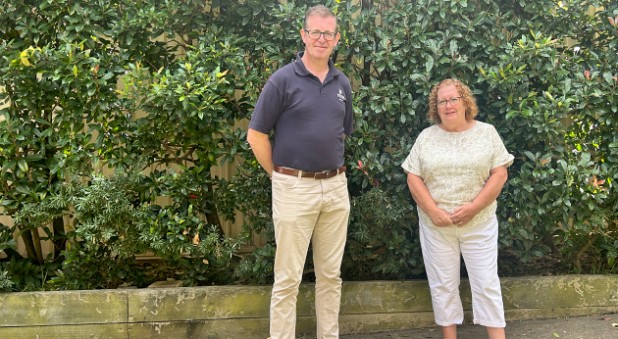Six months after her beloved husband Peter died of motor neurone disease, an advertisement popped up on Beth Riley’s Facebook feed for a GriefShare course at Panania Anglican Church. Knowing this was a “God moment”, she signed up immediately.
“I knew I needed help,” she says. “[Peter’s three-year illness] had been a frenzied time – caring for him in every aspect, organising health professionals and support workers, visitors, keeping family updated... I made an appointment with a local psychologist who gave me a few strategies, but I knew I needed a Christian perspective.”
The real power is sitting in a room with a dozen people who’ve all lost someone dear to them – just talking with people who get it ...
She joined a group of men and women – some Christian, others not – who met every Sunday afternoon for three months, with the course facilitated by the rector of Panania, the Rev Jon Guyer.
“The real power is sitting in a room with a dozen people who’ve all lost someone dear to them – just talking with people who get it and understand what grief is,” he says. “No-one’s experience of grief is the same, but there’s enough of a baseline that everyone appreciates that experience of being with others who know and understand.
“It’s also a thoroughly Christian course. It is the Bible plus the reflection on your relationship with God. It normalises being part of a church but includes some very specific stuff about the trouble for someone grieving when they are part of a church – the difficulty of going back to church for the first time without your loved one to sit next to.”
GriefShare is a video course, with a workbook, created and hosted by US evangelical couple Nancy and David Guthrie, who lost two of their own children to a rare metabolic disorder and produced the course to help others navigate life after loss.
Mr Guyer also ran the course in his previous parish of Wentworth Falls “because, after COVID, we had a number of people who hadn’t had the chance to grieve for people they had lost… I thought there must be some material out there and I found GriefShare. Then I realised Nancy Guthrie hosted it and it gave me a lot of confidence.”
It was such a comfort to meet weekly with people who were also grieving
Mrs Riley, who attends church in Menangle, says participants in the course had “homework” questions between each session, discussing their answers in the group before watching a video where others experiencing grief shared the challenges they have and how they had begun to recover from them.
“It was relatable in a head-nodding way,” she says. “Those people were articulating what I could not. Finally, someone else ‘got it’. We would finish the session discussing the video and end with prayer. It was such a comfort to meet weekly with people who were also grieving, to hear their varied stories of sorrow, and to support and encourage one another.
“Perhaps the most valued lesson I learned was that grief is not something to ‘get over’, but rather something to acknowledge, to remember our loved one, and to grow and to find resilience and hope. Hope in Jesus. Hope for a new life ahead both on earth and in heaven.”
Mr Guyer notes that psychologists have had a good deal of input into the GriefShare videos and regards the content as very practical.
“There’s a lot of wisdom for how to engage with grief and get yourself out of being stuck in grief – advice like don’t be rushed into getting rid of all your spouse’s clothes after they’ve passed, don’t make any big life decisions in the next six months: don’t sell your house or quit your job. Give it some time.
“One last benefit is that [the course] does have an evangelistic edge, it does explain the gospel – not just as an add-on, but as part of the real hope there is in finding meaning, even in the face of death.
I pray more churches are able to run the course, just like most Anglican churches offer pre-marital counselling. My dream is that it becomes a standard part of making funeral arrangements – family members being referred to a local GriefShare group where they can receive Christ-centred care and practical tips for this difficult season.”























